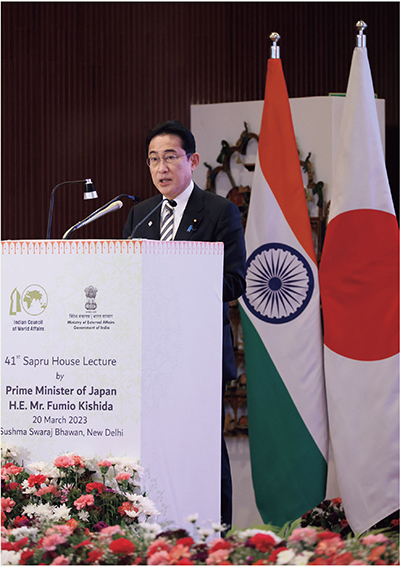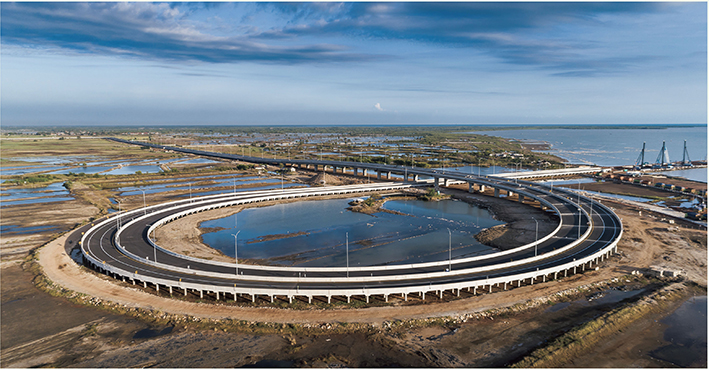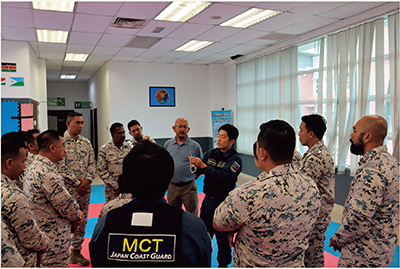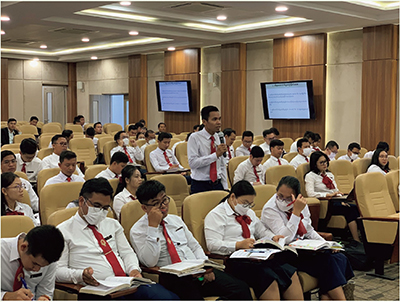ODA Topics 1
New Plan for a “Free and Open Indo-Pacific (FOIP)”

Prime Minister Kishida delivering a policy speech and announcing Japan’s new plan for a FOIP at the Indian Council of World Affairs (ICWA) (Photo: Cabinet Public Relations Office)

Video “New Plan for a ‘Free and Open Indo-Pacific (FOIP)’”
The Indo-Pacific region, which extends from the Asia-Pacific Ocean through the Indian Ocean to the Middle East and Africa, is the core of vitality for the world and home to half of the world’s population. To establish a free and open order based on the rule of law with the countries and regions of the Indo-Pacific and with various partners in the international community that share these ideals, Japan has promoted efforts to realize the “Free and Open Indo-Pacific (FOIP)” that Japan advocated in 2016.
On March 20, 2023, Prime Minister Kishida, who was on a visit to India, delivered a policy speech entitled “the Future of the Indo-Pacific—Japan’s New Plan for a ‘Free and Open Indo-Pacific’ — ‘Together with India, as an Indispensable Partner.’” With this speech, he announced Japan’s new plan for a “Free and Open Indo-Pacific (FOIP),” which launches the four pillars of cooperation for FOIP: (1) Principles for Peace and Rules for Prosperity, (2) Addressing Challenges in an Indo-Pacific Way, (3) Multi-layered Connectivity, and (4) Extending Efforts for Security and Safe Use of the “Sea” to the “Air.”
The new plan reaffirms FOIP’s core principles of “freedom,” “openness,” “diversity,” “inclusiveness,” and the “rule of law” at a time when the international community is at history’s turning point, and states that efforts to realize FOIP will be strengthened. As part of such efforts, Prime Minister Kishida announced that Japan would mobilize a total of more than 75 billion US dollars in public and private funds in the Indo-Pacific region by 2030 in infrastructure and grow together with other countries.
The Development Cooperation Charter, revised in June 2023, states the maintenance and strengthening of a free and open international order based on the rule of law as a priority policy for Japan’s development cooperation. In particular, under the vision of FOIP, the revised Charter demonstrates Japan’s strong determination to endeavor to promote these efforts and cooperate with developing countries to enable them to proactively engage in such an international order and enjoy its fruits, free from force or coercion.
Japan has promoted various initiatives that are in line with the four pillars of the new plan for a FOIP. One example is the construction of a new port in Patimban, located in the eastern part of the Jakarta metropolitan area in Indonesia. This project aims to strengthen the logistics functions of the metropolitan area with the construction of a container terminal at Patimban Port along with a car terminal and other facilities. This will help resolve capacity shortages at ports in the Jakarta metropolitan area, and facilitate exports by improving the efficiency of cargo logistics, which, in turn, will boost regional and international economic connectivity. The development of Patimban Port, which has good access from auto-related local manufacturers, including Japanese-affiliated companies, will contribute to the increase in exports from Indonesia, benefiting Japanese companies.
As this example shows, facilitating smooth logistics by securing connectivity also contributes to supporting Japanese companies’ exports to the Indo-Pacific region and overseas expansions. Japan supports developing countries to build “quality infrastructure” toward the realization of connectivity across the Indo-Pacific. In doing so, Japan works through its unique technical cooperation and human resources development so that the competitiveness of Japanese companies in ODA tendering and trust in Japan can be enhanced.
Japan also contributes to securing maritime peace and security. For example, in the Straits of Malacca and Singapore, a logistics hub for a large number of Japan-related vessels, Japan utilizes ODA to support capacity building for anti-piracy measures in coastal countries, thereby reducing the number of piracy incidents. Similarly, in the Indian Ocean, Japan contributes to ensuring marine traffic safety by providing capacity building assistance to coast guard agencies for maritime rescue, technical cooperation for nautical chart preparation, and support for enhancing Vessel Traffic Service (VTS).
Furthermore, Japan strengthens the promotion and consolidation of the rule of law in developing countries by assisting in the development of legal systems and judicial reforms. In this era where the international community faces compound crises, these efforts become increasingly important. Japan contributes to establishing good governance in developing countries, creating a foundation that is crucial to the realization of sustainable growth, and fostering an effective trade and investment environment for Japanese companies’ overseas expansions.
Japan is an island country and the fourth-largest trading country in the world. Its industries and the lives of its people are heavily reliant on maritime transportation and cargo. From this perspective, securing connectivity and ensuring the safety of sea lanes are important for Japan’s economic, energy, and food security. The stability and prosperity of Japan and the Indo-Pacific region cannot be realized without a “Free and Open Indo-Pacific (FOIP)” where diverse people, goods, and wisdom are actively exchanged, supported by highly transparent rules. Japan will continue to make efforts to realize FOIP, while aiming to maximize the impact of its development cooperation, with ODA at its core.

Access road to Patimban Port in Indonesia (Photo: Oriental Consultants Global Co., Ltd.)

JICA and the Japan Coast Guard conducting an arresting technique training course for the Malaysian Maritime Enforcement Agency (MMEA)

A seminar for students at a school of judges and prosecutors conducted under the “Legal and Judicial Development Project” in Cambodia (Photo: JICA)
